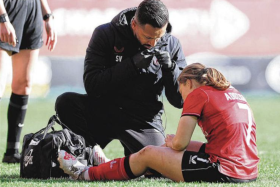Feeling blue? Check your hormone levels
Some men with low testosterone, known as andropause, suffer in silence as they are embarrassed to see a doctor
Ismail (not his real name), a 50-year-old happily married man with three adult children and four grandchildren, thought he was finally reaching his golden years.
Then within a year, he began having hot flushes and started getting irrationally angry, which resulted in strained relationships with his family members.
With a history of hypertension as well as high cholesterol, Ismail decided to see a doctor.
Dr Julian Ng, a resident doctor from DTAP Clinic at Novena, discovered that Ismail was suffering from androgen deficiency, which other doctors Ismail saw did not pick up on.
Ismail was told that what he was going through was normal and was advised to seek out a psychologist for his problem.
But after six months of treatment to combat low testosterone, his symptoms improved, prompting his wife to comment that he was almost back to his normal self.
The condition of having low testosterone levels, also known as andropause - described as the male counterpart of menopause - receives much less attention in the public and private spheres as "sexual health-related issues often cause people to feel embarrassed", Dr Ng told The New Paper.
"In addition... men are less likely to seek medical attention."
Unlike in menopause, where women lose their menstrual cycle as a natural part of ageing, the hormone loss levels in men are not as severe.
However, the decrease in male hormones around middle age similarly paves the way for changes in the body's optimal functioning.
What are the symptoms of andropause?
Symptoms include mood fluctuations, poor concentration, low energy or lethargy, low stamina, decreased libido, difficulty getting and keeping erections, hot flushes, sweats and even osteoporosis (the thinning of bones).
Said Dr Ng: "The more common symptoms are low libido, low energy, erection issues and mood changes.
"These are problems many men find difficulty talking to anyone about. Thus they tend to suffer in silence."
Who is more susceptible to suffering from andropause?
According to Dr Ng, those with a metabolic syndrome such as diabetes, high cholesterol, high body fat or high blood pressure are more likely to suffer from androgen deficiency. Depression also increases the likelihood of one having low testosterone.
How do you prevent or mitigate andropause symptoms?
Dr Ng advises men of all ages to keeping a healthy lifestyle, which can prevent or alleviate some of the symptoms, as exercise and a balanced diet help to decrease body fat, which in turn increases the testosterone in the body.
It has been shown that obese men can have testosterone levels 25 per cent lower than men of a normal weight.
Resistance training exercises such as weight training have been shown in some studies to have a positive effect on testosterone levels.
Smokers are strongly encouraged to quit smoking as it could exacerbate the symptoms.
What treatments are available in Singapore?
Men with andropause may opt for the treatments such as testosterone replacement injections, capsules or testosterone gel.
Injections are generally administered once every eight to 12 weeks.
Capsules are an option for those who do not like needles. However, the drawbacks of ingesting testosterone are that it places stress on the liver and absorption is poorer than with gel or injection.
Dr Ng said: "Testosterone gels provide the best absorption and most stable levels compared with the other two routes of administration. It is also the easiest option for most people as it requires you only to apply the gel on the skin."
Get The New Paper on your phone with the free TNP app. Download from the Apple App Store or Google Play Store now


